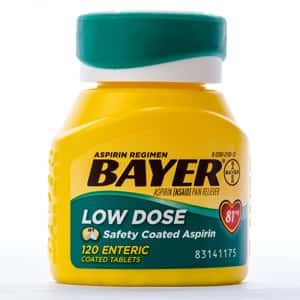
Pancreatic cancer is a killer. Less than 8 percent of those diagnosed with this disease are still alive after five years. It is more common than most people realize. So news that people who took aspirin reduced their chance of developing pancreatic cancer is encouraging.
The research was conducted in Shanghai, China, and compared 761 newly diagnosed pancreatic cancer patients to 794 cancer-free control subjects (Cancer Epidemiology, Biomarkers & Prevention, online Dec. 19, 2016). They were interviewed about their health and habits, including smoking and aspirin use.
How Helpful Was Regular Aspirin Use?
The investigators found that 11 percent of the cancer patients were regular aspirin users, compared to 18 percent of the controls. This does not sound impressive, but the relative risk is: Regular aspirin use meant people were 46 percent less likely to be diagnosed with pancreatic cancer. The authors note that these data are consistent with those from other populations around the world.
Aspirin & Pancreatic Cancer: Other Research?
The Chinese research described above is epidemiological in nature. That means it provides a signal rather than proof positive that aspirin absolutely works against pancreatic cancer.
One of the first things we like to see when we read an interesting epidemiological study is a potential mechanism put forth. An article in the American Journal of Physiology. Cell Physiology (Nov. 30, 2016) offered just such a molecular mechanism:
“Aspirin, an anti-inflammatory and anti-thrombotic drug, has become the focus of intense research as a potential anti-cancer agent owing to its ability to reduce tumor proliferation in vitro [in test tubes] and to prevent tumorigenesis in patients. Studies have found an anti-cancer effect of aspirin when used in low, anti-platelet doses…In conclusion, we show for the first time that inhibition of platelets by aspirin can affect their ability to induce cancer cell proliferation through the modulation of the c-MYC oncoprotein.”
Other researchers are more succinct (Biochimica et Biophysica, Acta, Dec., 2016):
“In brief, aspirin is a promising chemopreventive agent and exerts significant therapeutic potentials in pancreatic cancer.”
What About Meta-Analyses?
The largest meta-analysis of aspirin vs. pancreatic cancer was published in Scientific Reports (Oct. 21, 2015). The authors reviewed data from 12 observational studies involving over 250,000 subjects. The conclusion:
“The major findings of this meta-analysis support the mechanistic hypothesis that aspirin use (specifically, high- and medium-frequency use) is inversely related to the risk of pancreatic cancer. “
Aspirin and Other Common Cancers:
Aspirin use has also been associated with reduced risks of a variety of cancers, including those of the colon, stomach, esophagus, lung, breast and prostate (Cancer Causes & Control, Nov. 2016).
A thoughtful review titled: “The Role of Common Pharmaceutical Agents on the Prevention and Treatment of Pancreatic Cancer” adds helpful information to this discussion (Gut and Liver, Sept., 2016).
“With regards to the chemotherapeutic potential of aspirin in pancreatic cancer, there are fewer dedicated studies. A large, pooled analysis of 25,570 patients in eight randomized trials showed a survival benefit of daily aspirin (75 mg or greater) for several common cancers including pancreatic, esophageal, lung, stomach, and colorectal. This association increased with duration of treatment…Aspirin, but not NSAIDs, may have slightly reduced risk of incidence pancreatic cancer, but not to a clinically relevant degree.”
The Downsides of Aspirin:
Until there is a randomized controlled trial of aspirin against pancreatic cancer we will not know for sure how beneficial the drug really is. We do know that aspirin does have potential side effects that can be serious. These include bleeding ulcers or hemorrhagic strokes. Aspirin can also interact with other medications. Anyone contemplating using aspirin as a cancer preventive must consult a primary care provider first.

